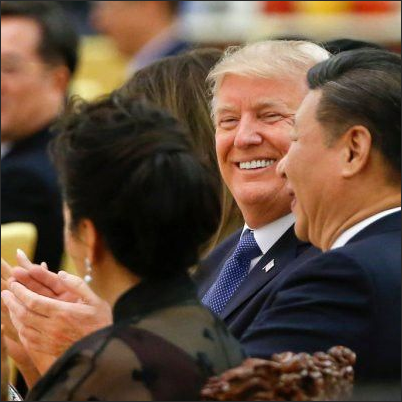The United States is now essentially energy independent, technologically advanced and innovative, food independent, has outstanding infrastructure, great “human capital”, blessed with raw material or bargainable trade-offs, comprises a huge market, all sufficient so as to insist on fairer trade deals with the likes of China — a thieving (technology) cheating (on existing trade deals) and to a great extent slave economy (command and control communist regime).

China is very vulnerable as its bare sustenance not to mention growth is dependent on others. Half of all the world’s steel, copper, coal and cement goes to China, as well as about half of the world’s pork output and a third of its rice.* Not to mention soybeans. Yes that means China is an important market for the suppliers of those necessities but those suppliers are not by and large as vulnerable.
Our economic indicators are still solid compared to China as “December jobs creation far exceeded expectations, bolstering Mr Trump’s belief that his trade policies have not damaged the US economy — and may even be helping.” *
https://www.ft.com/chinese-economy
https://www.bbc.com/news/business-46755158
The Gordan G Chang article excerpted below explains further the superior position Trump bargains from on behalf of long term interests of the US (and frankly China and the world economy). Bold emphasis ours. It appeared, of all places, in The Daily Beast. R Mall
Why China Will Lose a Trade War With Trump
We hear a variation of this argument when American retailers, politicians, and others contend that Trump’s tariffs will punish Americans, who have become accustomed to buying cheap goods.
Yet China, as its promoters have told us for a half-decade, is no longer the lowest-cost producer of many items. Take Stiglitz’s example of apparel. At the beginning of this century, about 90 percent of apparel sold at Walmarts was made in China. By the end of 2012, that balance between China and the rest of the world essentially reversed. Then, my wife, surveying our local Walmart, found that every item of the store’s house brand, George, was made in Bangladesh. Simply Basic sleepwear came from Cambodia. Items with the Hanes label were stitched together in Guatemala and El Salvador. Wrangler jeans were imported from Nicaragua, and Fruit of the Loom clothes came in from Honduras. Danskin garments? They were made in the Middle East and Africa: Jordan, Egypt, and Kenya.
Trump’s tariffs on apparel or other items, even if they make Chinese goods more expensive or unavailable, will not result in significant cost increases beyond a month or two. Americans will soon be buying their low-cost items from other producers, which are already, if I may use the phrase, beating the pants off China.
Second, Stiglitz has also been making the authoritarian-societies-are-good-at-weathering-storms argument. “China is better positioned and has wider range of instruments than the United States to absorb economic disturbance if the trade tension between the two countries intensifies,” he said, as summarized by China Daily. “China has more ability to direct some parts of the economy as the country has increasingly shifted toward domestically-driven demand and it can use government projects to increase demand in areas that might be suffering.”
It’s true that Trump, presiding over a free-market economy, cannot do what Stiglitz says Beijing can accomplish. Yet the Nobel-prize-winning economist misunderstands what has been happening in China.
Even if Beijing’s statistics regarding consumption’s contribution to economic output are correct—extremely unlikely—consumption is ultimately not the driver of growth in China. The ultimate driver remains investment. Consumption in China falls whenever Beijing reduces the flow of state-directed investment. And because of debt concerns, Chinese technocrats are losing the ability to create growth by investing.
For decades, Chinese leaders have staked their legitimacy primarily on the continual delivery of prosperity. Trump not only threatens the Chinese economy but also the Communist Party’s political system. That gives China’s leaders great incentive to hold back retaliatory moves.
Third, analysts love to point out that China can retaliate by not buying U.S. products. “American firms may not profit from a trade war with China, but both Airbus and Brazilian farmers have to be salivating at the prospect,” writes Colin Grabow of the Cato Institute in “Americans Will Pay the Price for Trump’s Toughened Approach with China,” posted Friday on the website of The National Interest.
Boeing executives and American soybean producers are right to be nervous, but they surely know how global markets work. If China does not buy soybeans from the American heartland and purchases them from Brazil instead, American producers will sell soy to Brazil’s customers.
There are only so many soybeans in the world at the moment, and the same principle generally holds for commercial aircraft. Airlines and leasing companies are unlikely to wait years longer because Airbus’ production has been diverted to China to fill orders that would have gone to Boeing. In most cases, Airbus customers will opt for Boeing craft to fill needs.
In short, Trump holds the high cards when it comes to China, and, unlike his predecessors, he knows it.
